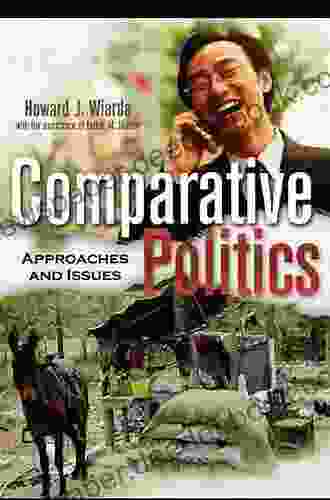Comparative Politics: Approaches and Issues

Comparative politics is the study of politics across different countries and regions. It seeks to identify similarities and differences in political systems, institutions, and processes, and to explain why these variations exist. Comparative politics is a vast and complex field, and there are many different approaches to studying it.
4 out of 5
| Language | : | English |
| File size | : | 4033 KB |
| Text-to-Speech | : | Enabled |
| Screen Reader | : | Supported |
| Enhanced typesetting | : | Enabled |
| Word Wise | : | Enabled |
| Print length | : | 306 pages |
This article will provide an overview of some of the major approaches to comparative politics, as well as some of the key issues that scholars in this field study. We will begin by discussing the different ways that comparative politics can be defined and conceptualized. We will then examine some of the most common methods used by comparative political scientists, including case studies, comparative historical analysis, and statistical analysis. Finally, we will discuss some of the major debates and controversies in comparative politics, such as the debate over whether there is a single "best" way to study politics.
Defining Comparative Politics
Comparative politics can be defined as the systematic study of political systems, institutions, and processes across different countries and regions. The goal of comparative politics is to identify similarities and differences between political systems, and to explain why these variations exist.
There are many different ways to define comparative politics. Some scholars define it as the study of "politics in different countries." Others define it as the study of "the similarities and differences between political systems." Still others define it as the study of "the causes and consequences of political variation."
No matter how it is defined, comparative politics is a vast and complex field. It encompasses a wide range of topics, including political institutions, political parties, electoral systems, public policy, and international relations. Comparative political scientists use a variety of methods to study these topics, including case studies, comparative historical analysis, and statistical analysis.
Approaches to Comparative Politics
There are many different approaches to comparative politics. Some of the most common approaches include:
* Institutionalism is the study of political institutions, such as legislatures, courts, and bureaucracies. Institutionalists argue that institutions shape political outcomes by providing incentives and constraints for political actors. * Behavioralism is the study of political behavior, such as voting, party identification, and interest group participation. Behavioralists argue that political behavior is shaped by a variety of factors, including social and economic conditions, political institutions, and cultural norms. * Rational choice is the study of political decision-making, based on the assumption that individuals make rational choices in order to maximize their utility. Rational choice theorists argue that political outcomes can be explained by the rational decisions of political actors. * Historical institutionalism is the study of how political institutions evolve over time. Historical institutionalists argue that institutions are shaped by a variety of factors, including past experiences, social and economic conditions, and political culture. * Comparative political economy is the study of the relationship between politics and economics. Comparative political economists argue that economic factors can shape political outcomes, and vice versa.
These are just a few of the many different approaches to comparative politics. Each approach has its own strengths and weaknesses, and scholars often combine different approaches in their research.
Issues in Comparative Politics
Comparative political scientists study a wide range of issues, including:
* Political institutions are the formal structures through which political power is exercised. Comparative political scientists study different types of political institutions, such as legislatures, courts, and bureaucracies, and how they shape political outcomes. * Political parties are organizations that seek to gain control of government. Comparative political scientists study different types of political parties, such as mass parties, elite parties, and cadre parties, and how they interact with other political institutions. * Electoral systems are the rules that govern the way elections are conducted. Comparative political scientists study different types of electoral systems, such as plurality systems, proportional representation systems, and mixed systems, and how they affect political outcomes. * Public policy is the set of policies that governments adopt. Comparative political scientists study different types of public policies, such as social welfare policies, economic policies, and foreign policies, and how they affect citizens' lives. * International relations is the study of interactions between nations. Comparative political scientists study different types of international relations, such as alliances, wars, and trade agreements, and how they affect global politics.
These are just a few of the many different issues that comparative political scientists study. The field of comparative politics is vast and complex, and there is always something new to learn.
Debates and Controversies in Comparative Politics
Comparative politics is a vibrant and dynamic field, and there are many debates and controversies among scholars. Some of the most common debates include:
* The debate over whether there is a single "best" way to study politics. Some scholars argue that the best way to study politics is to focus on a single country or region, while others argue that it is better to compare different countries and regions. * The debate over the role of culture in politics. Some scholars argue that culture has a major impact on political outcomes, while others argue that it is less important than other factors, such as economic development or political institutions. * The debate over the relationship between democracy and economic development. Some scholars argue that democracy is a necessary condition for economic development, while others argue that it is not. * The debate over the future of comparative politics. Some scholars argue that the field is in decline, while others argue that it is more vibrant than ever.
These are just a few of the many debates and controversies in comparative politics. The field is constantly evolving, and there is always something new to learn.
Comparative politics is a vast and complex field that encompasses a wide range of topics and issues. Comparative political scientists use a variety of methods to study politics across different countries and regions, and they engage in a variety of debates and controversies. The field of comparative politics is constantly evolving, and there is always something new to learn.
4 out of 5
| Language | : | English |
| File size | : | 4033 KB |
| Text-to-Speech | : | Enabled |
| Screen Reader | : | Supported |
| Enhanced typesetting | : | Enabled |
| Word Wise | : | Enabled |
| Print length | : | 306 pages |
Do you want to contribute by writing guest posts on this blog?
Please contact us and send us a resume of previous articles that you have written.
 Chapter
Chapter Text
Text Story
Story Genre
Genre Reader
Reader Paperback
Paperback E-book
E-book Newspaper
Newspaper Sentence
Sentence Glossary
Glossary Bibliography
Bibliography Foreword
Foreword Preface
Preface Synopsis
Synopsis Annotation
Annotation Footnote
Footnote Manuscript
Manuscript Scroll
Scroll Library card
Library card Autobiography
Autobiography Encyclopedia
Encyclopedia Dictionary
Dictionary Thesaurus
Thesaurus Narrator
Narrator Character
Character Resolution
Resolution Card Catalog
Card Catalog Borrowing
Borrowing Stacks
Stacks Archives
Archives Study
Study Scholarly
Scholarly Reserve
Reserve Reading Room
Reading Room Rare Books
Rare Books Study Group
Study Group Thesis
Thesis Storytelling
Storytelling Theory
Theory Textbooks
Textbooks Arthur G Sharp
Arthur G Sharp Sandra Van Thiel
Sandra Van Thiel Paul Sperry
Paul Sperry Louise Cainkar
Louise Cainkar Revised Edition Kindle Edition
Revised Edition Kindle Edition Rick Gates
Rick Gates Kuu
Kuu John Nichols
John Nichols Brent E Sasley
Brent E Sasley Julie Miller
Julie Miller Julian Schweitzer
Julian Schweitzer Kris Butler
Kris Butler Arturo Barea
Arturo Barea Stacey L Smith
Stacey L Smith Yozo Miyake
Yozo Miyake Harald Voetmann
Harald Voetmann Samantha Henthorn
Samantha Henthorn Danielle Stewart
Danielle Stewart Robert Abramowitz
Robert Abramowitz Deborah Lynn Porter
Deborah Lynn Porter
Light bulbAdvertise smarter! Our strategic ad space ensures maximum exposure. Reserve your spot today!
 Thomas HardyFollow ·19.1k
Thomas HardyFollow ·19.1k Devin CoxFollow ·8.8k
Devin CoxFollow ·8.8k Mason PowellFollow ·8.7k
Mason PowellFollow ·8.7k Junot DíazFollow ·15.3k
Junot DíazFollow ·15.3k Heath PowellFollow ·12.4k
Heath PowellFollow ·12.4k Matthew WardFollow ·11.5k
Matthew WardFollow ·11.5k Abe MitchellFollow ·12.3k
Abe MitchellFollow ·12.3k Hamilton BellFollow ·6.9k
Hamilton BellFollow ·6.9k

 Elias Mitchell
Elias Mitchell50 Amazing Color Paintings Of Pierre Paul Prud'Hon French...
Pierre Paul Prud'Hon (1758-1823) was a French...

 Owen Simmons
Owen SimmonsAgenda 21: A Comprehensive Guide to Glenn Beck's Baseless...
Agenda 21 is a...

 Mark Twain
Mark TwainExploring the Intricate Art of Choreography: Craft,...
Choreography, an art form that combines...

 Robert Heinlein
Robert HeinleinWhere Do Hurricanes, Typhoons, and Cyclones Come From?
A 2nd Grade Science...

 Isaiah Price
Isaiah PriceThe Profound Place of Music in the Australian Aboriginal...
: Unveiling the Heartbeat...
4 out of 5
| Language | : | English |
| File size | : | 4033 KB |
| Text-to-Speech | : | Enabled |
| Screen Reader | : | Supported |
| Enhanced typesetting | : | Enabled |
| Word Wise | : | Enabled |
| Print length | : | 306 pages |













